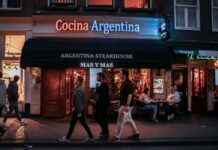This election scheduled for February 2023 risks turning into a duel between north and south in a very polarized Nigeria, plagued by generalized insecurity and an economic crisis, analysts say.
Originally from the south-west, Bola Ahmed Tinubu, nicknamed «the godfather» for his immense influence, is the candidate of the ruling party, the Congress of Progressives (APC).
A wealthy 70-year-old Muslim, he rose through the political ranks on corruption charges, without ever being convicted. Mr. Tinubu was notably governor of Lagos, the economic heart of Nigeria.
– «Termites» –
His main opponent is a veteran politician from the northeast: former vice-president Atiku Abubakar, 75, nominated candidate of the People’s Democratic Party (PDP), the main opposition party.
This sulphurous businessman, also a Muslim and accused of corruption, is running for president for the sixth time in thirty years.
The longest electoral campaign since the return of democracy in Nigeria in 1999 (8 months) «increases the risk that political rhetoric fuels violence», warns the consulting firm Eurasia Group.
On Wednesday, upon the announcement of his victory in the APC primary, Bola Tinubu described his opponents of the PDP as «termites» and «agents of poverty».
He attacked the balance sheet of the 16 years spent in power of the PDP (1999-2015), throwing to them: «Get buried and leave us the way free».
In the aftermath, the PDP reacted by saying that Nigerians hold Bola Tinubu «responsible for the failed administration led by Muhammadu Buhari, which has subjugated the people, brought excruciating economic hardship, acute poverty and massacres».
– North against South –
This will be one of the key arguments of the opposition: to discredit the «godfather» on the assessment deemed catastrophic of President Muhammadu Buhari, in power since 2015.
Atiku Abubakar will also attack the state of health of Bola Tinubu, who denies being sick. But «trembling episodes suggest he has a neurodegenerative disease,» writes Eurasia Group.
In addition to these verbal contests, the central subject of the 2023 presidential election is a Nigerian specificity: «zoning». According to this tacit agreement, the presidency must alternate every two terms between a candidate from the north, mainly Muslim, and from the south, mainly Christian.
This principle aims to maintain balance in a country with more than 250 ethnic groups and where tensions between communities are frequent.
Since President Buhari hails from the north, the presidency should be run by a candidate from the south. But the PDP chose to ignore the «zoning» by designating Mr. Abubakar, from the northeast.
The main reason: to attract voters from the north where «the votes were excessively important during the last presidential election», underlines Adedayo Ademuwagun, of the Songhai security consulting firm.
All eyes are now on the running mate of the candidates who have until June 17 to designate their possible future vice-president. Tradition has it that this duo is made up of a Christian and a Muslim. MM. Tinubu and Abubakar should therefore choose a Christian running mate.
– Insecurity, economic crisis –
But this geographical dispute «overshadows» the substantive issues of security and the economy, underlines Mr. Ademuwagun.
The massacre of 40 parishioners in a church on Sunday in the southwest, relatively spared from the violence, is a cruel reminder of the almost general insecurity in the country.
Theater for twelve years of a jihadist insurgency in the northeast, Nigeria is also plagued by criminal gangs in the center and northwest and a separatist movement in the southeast.
«Meanwhile, inflation is at 17% and GDP growth is running out of steam,» Ademuwagun continues.
The Nigerian giant, already battered by the Covid-19 pandemic, is also being hit by the consequences of the war between Russia and Ukraine, which is driving up food and energy prices across the continent.
Nearly a third of Nigeria’s 215 million people live below the poverty line.
And the gap is widening between the elite embodied by Bola Tinubu and Atiku Abubakar and the Nigerian youth – 60% of the population is under 25 – eager for change.
The two candidates suffer from a very bad image, explains Ikemesit Effiong, from the firm SBM Intelligence, who adds: «The electorate is really disillusioned».














